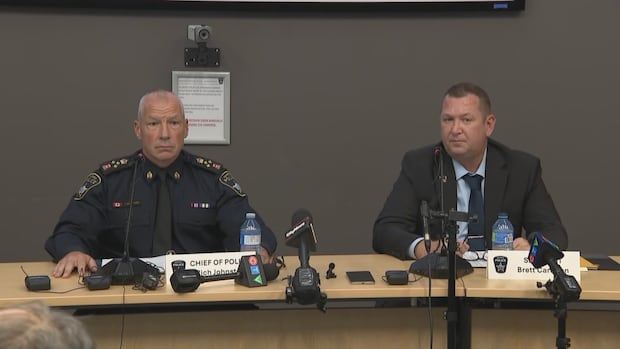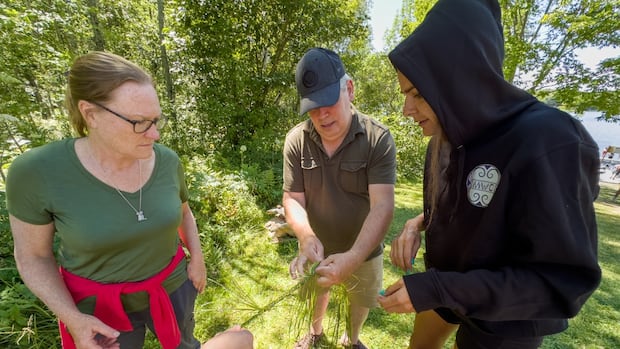Adeb Arianson fled his home in Kabul just days before the capital of Afghanistan fell to the Taliban in 2021, as Western nations were evacuating their citizens and panic seized the city.
He crossed the border to Tajikistan, where he had to spend a few weeks in a hospital recovering from physical and mental shock.
“The panic attacks, the thoughts that were coming on and all the pressure of what’s going to happen? What am I going to do?” Arianson recalled in a recent interview.
“It was constant panic attacks. It was fear, it was just shock.”
Arianson, now 23, eventually arrived in Canada as a government-assisted refugee in 2022. He will be a guest speaker at an international conference in Halifax this weekend, where hundreds of health-care workers are gathering to discuss refugee and migrant health.
Last year the conference had more than 1,000 attendees, and about 75 per cent of them were from the United States. This year attendance has dropped to about 500.
Many attendees didn’t attend because they were afraid of having trouble re-entering the United States—particularly if they were not born there—in the wake of the Trump administration’s immigration policies. As well, many agencies had their federal funding cut, said conference organizer Dr. Annalee Coakley.
She said the conference attendees are planning to send a message about protection of vulnerable migrants by drafting a statement they are calling the “Halifax Declaration,” which they will submit to a major medical journal.
“Patients are very, very fearful if they come from a migrant background,” said Coakley, a family doctor who works in Inverness, N.S. She is also the co-director of a research program on refugee health in Calgary.
“Together we have a shared voice, and we share values and so we’re hoping to put together a statement in support of refugee and migrant rights, and their right to health,” she said.
In January 2025, the Trump administration issued an executive order saying it would suspend the United States Refugee Admission Program for an indefinite period of time.
President Donald Trump called on U.S. Immigration and Customs Enforcement (ICE) to carry out mass deportations, and ended programs that allowed some migrants to live and work in the United States.

Refugees go through a different process, which usually involves being referred for resettlement by the United Nations.
In the days following the suspension of the refugee admission program, thousands of refugees who were cleared to travel to the U.S. had their plans halted, including Afghan refugees who helped American armed forces when they were based in that country.
Arianson has been following the news from his home in Halifax, and felt it was important to speak out at the conference.
“As a refugee myself, as someone who went through this journey, I have seen the gaps and the struggles that refugees go through,” he said.
“I saw the opportunity and I thought I have the chance to raise my voice.”
Arianson was 18 years old when he left Afghanistan, and fled alone because his immediate family was killed when he was a toddler after the family car struck an explosive device.
As a queer person and proud member of Halifax’s LGBTQ community, Arianson knew living in Afghanistan under the Taliban would be dangerous for him.
“Refugees are people that are just looking for a spot, a place to just be able to be themselves and be alive,” he said, adding that he thinks it is “inhumane” for the United States to close its doors to refugees.
Dr. Katherine McKenzie is the director of the Yale Center for Asylum Medicine, and came to the Halifax conference from New Haven, Conn.
“I am very worried and concerned, and really sad as well,” said McKenzie, who cares for many resettled refugee families.
“I am always concerned that the families will be split up, that maybe a mom or dad will be deported,” she said. “What will happen with the children in that case?”
McKenzie said she is seeing families come to her clinic filled with stress and anxiety.
“Obviously I’m a doctor, I want people who I see as patients to be healthy — mentally healthy and physically healthy. And this scenario … is absolutely interfering and having an effect on mental and physical health,” she said.
Coakley said in her first conference meeting, one attendee shared a story of a family who delayed bringing their child to an emergency department out of fear of being deported.
“When they finally did present to the emergency department they had a ruptured appendix, and that’s potentially life-threatening,” she said.
“That’s a very precarious place to be, and it’s unconscionable in a country with plenty,” she said.





